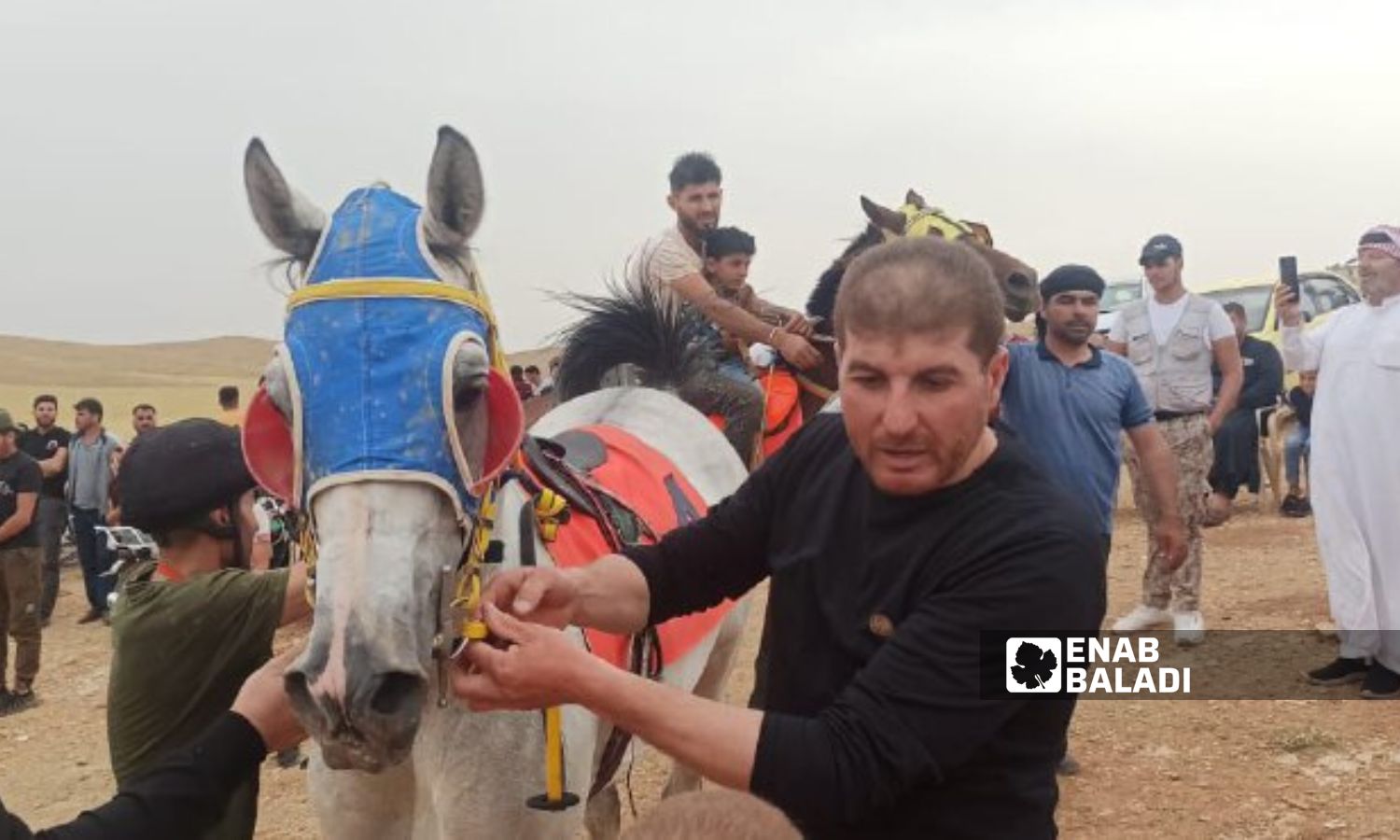



Daraa – Halim Muhammad
A group of purebred Arabian horse breeders in the eastern countryside of Daraa province, southern Syria, oversaw the organization of horse races, with participants from the cities of Daraa, Quneitra, and As-Suwayda, and from the capital Damascus.
The races were held on May 11, 2024, at the horse racing track in the Gharz area, west of Nassib village in eastern Daraa countryside. This track is the second to open in 2024.
There are two racing tracks in Daraa. The first track is around Hirak village (donated by its owner for a full year), and the second is west of Nassib village in the eastern Daraa countryside, according to Khaled al-Adwan, one of the race coordinators, who spoke to Enab Baladi.
The availability of a place to hold the races contributed to reviving this sport early in 2022. There was an earlier attempt in Daraa al-Balad, but it failed, according to al-Adwan.
Regarding the success of these competitions, al-Adwan said that there is a committee composed of horse breeders responsible for organizing the races, and supervising them. The committee also established a donation fund where the prizes are determined based on its budget, and from which the race expenses and worker wages are paid.
The committee determines the races and distances based on the number of participants and the age of the horses.
The races are suspended during the winter for fear of the horses’ health, as they are naturally sensitive, according to al-Adwan.
Ahmed al-Ghawthani (19 years old) won first place in the last race. He told Enab Baladi that equestrianism is a hobby and a skill that requires effort, continuous training, and care for the horse.
He added that the race organizers are the purebred horse breeders and stable owners, calling for the establishment of a club specialized in thoroughbred horses, providing trainers and veterinary observers to monitor the horses’ health.
Muhammad al-Mahameed, a purebred horse breeder and racer, told Enab Baladi that the races are the most important aspect of horse breeding, as they test the horse’s speed, encourage breeders to continue raising horses, and create a spirit of competition striving to be the best.
Al-Mahameed added that Daraa province lacks equestrian clubs, and the competitions are a popular activity organized by horse breeders, with symbolic prizes given to the winning horses.
He believes that Daraa horses are distinguished by their agility and win prizes if they participate in races at the republican level.
Among the obstacles that keep a racer from participating in the race are the costs of horse transportation and the jockey fees.
A jockey is the rider who mounts the horse in the event of participation without its original rider.
One of the main features of horses in Syria is the existence of lineage that clarifies their origins and types. This is important as it determines the horse’s type, price, and capabilities.
The military operations in the province over the past years led to the loss of horse lineage and the inability of local authorities, who controlled the province between 2012 and 2018, to manage this matter.
Muhammad al-Mahameed said that some horses lost their lineage during the past years due to the inability to prove their lineage during the period when most areas in Daraa were out of the regime’s control and under opposition control, making registration impossible.
However, the situation has changed today. There is an office in Daraa affiliated with the Ministry of Agriculture that takes blood samples and sends them to Damascus, which are then sent to Britain to determine the horse’s lineage. This process takes six months, and the breeder pays fees amounting to 600,000 Syrian pounds.
If the horse’s blood matches the purity requirements, the office stamps the horse and gives it a purity certificate.
Basil al-Jadaan, a member of the executive committee of the World Arabian Horse Organization (WAHO), said in a statement reported by the official Syrian News Agency (SANA) in 2022 that the number of registered Arabian horses in Syria is close to ten thousand horses.
Al-Jadaan pointed out that the number increases every year due to new births registered in coordination with the breeder after blood samples are taken and matched with the parents’ lineage.
Syria joined the World Arab Horse Organization (WAHO) in 1989, and since 1990, Syria annually publishes the pedigree book for purebred Arabian horses.
if you think the article contain wrong information or you have additional details Send Correction